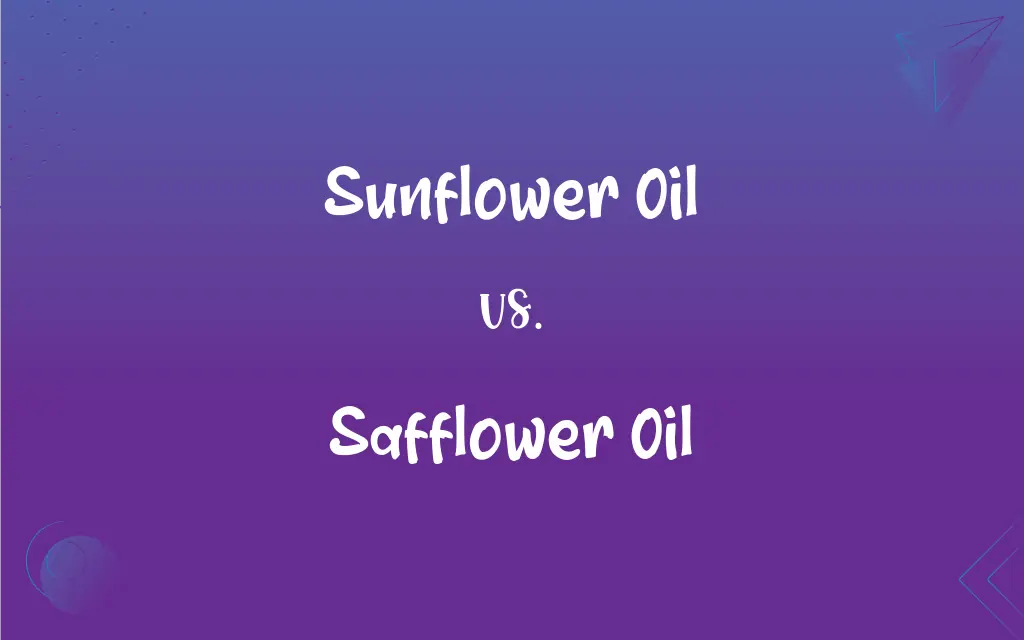Sunflower Oil vs. Safflower Oil: What's the Difference?
Edited by Harlon Moss || By Janet White || Published on January 27, 2024
Sunflower oil is extracted from sunflower seeds, known for its light taste and high vitamin E content, whereas safflower oil comes from safflower seeds, noted for its high monounsaturated and polyunsaturated fats.

Key Differences
Sunflower oil is derived from the seeds of the sunflower plant, characterized by a light, mild flavor, making it suitable for cooking at medium-high temperatures. Safflower oil, obtained from safflower seeds, is valued for its nutritional qualities and is often used in cold dishes due to its subtle flavor.
In terms of health benefits, sunflower oil is rich in vitamin E and low in saturated fat, making it a heart-healthy choice. Safflower oil, especially high-oleic versions, is known for its high monounsaturated fat content, beneficial for cardiovascular health.
Sunflower oil is versatile, used in frying, baking, and salad dressings, appreciated for not overpowering other flavors. Safflower oil, with a high smoke point, is ideal for high-heat cooking, such as deep frying and sautéing, without altering the taste of food.
The production of sunflower oil involves pressing and extracting oil from sunflower seeds, a process that can affect the oil's flavor and nutritional content. Safflower oil extraction, similarly, can vary, with cold-pressed versions retaining more natural properties.
In the culinary world, sunflower oil is often chosen for its affordability and availability in various grades, such as refined and unrefined. Safflower oil, though less common, is increasingly sought after for its health benefits and suitability in various diets.
ADVERTISEMENT
Comparison Chart
Source
Sunflower seeds
Safflower seeds
Flavor
Light, mild
Subtle, neutral
Primary Use
Cooking, baking, dressings
Cold dishes, high-heat cooking
Health Benefits
High in vitamin E, low in saturated fat
High in monounsaturated and polyunsaturated fats
Cooking Suitability
Medium-high heat
High heat
ADVERTISEMENT
Sunflower Oil and Safflower Oil Definitions
Sunflower Oil
Sunflower oil is a commonly used oil in cooking and food processing.
The chef preferred sunflower oil for its versatility in different recipes.
Safflower Oil
Safflower oil is a common ingredient in cosmetic and skincare products.
Her favorite moisturizer contained safflower oil for its hydrating properties.
Sunflower Oil
Sunflower oil is a clear, yellow oil used for frying and baking.
Sunflower oil's high smoke point makes it ideal for frying chicken.
Safflower Oil
Safflower oil is suitable for various diets, including keto and paleo.
On his keto diet, he often cooked with safflower oil due to its fat content.
Sunflower Oil
Sunflower oil is a vegetable oil pressed from sunflower seeds.
She used sunflower oil to make her famous light and fluffy pancakes.
Safflower Oil
Safflower oil is high in unsaturated fats, beneficial for heart health.
Incorporating safflower oil into her diet helped improve her cholesterol levels.
Sunflower Oil
Sunflower oil is known for its light taste and high vitamin E content.
For a healthier choice, he switched to sunflower oil in his cooking.
Safflower Oil
Safflower oil is a flavor-neutral oil extracted from safflower seeds.
He drizzled cold-pressed safflower oil over his salad for added nutrients.
Sunflower Oil
Sunflower oil is a popular choice for its neutral flavor in dressings.
Her salad dressing featured sunflower oil for a subtle, light taste.
Safflower Oil
Safflower oil is often used in cooking for its high smoke point.
Safflower oil was her go-to for stir-frying vegetables.
FAQs
What is safflower oil?
Safflower oil is a cooking oil extracted from safflower seeds, known for its neutral flavor and health benefits.
Is sunflower oil healthy?
Sunflower oil is considered healthy due to its high vitamin E content and low saturated fat.
Can sunflower oil be used for frying?
Yes, sunflower oil can be used for frying due to its medium-high smoke point.
Does sunflower oil contain omega-6 fatty acids?
Yes, sunflower oil is a good source of omega-6 fatty acids.
What is sunflower oil?
Sunflower oil is a vegetable oil extracted from sunflower seeds, used in cooking and food processing.
What is refined sunflower oil?
Refined sunflower oil is processed to remove impurities, resulting in a lighter taste and higher smoke point.
How should I store safflower oil?
Store safflower oil in a cool, dark place to preserve its quality.
Can sunflower oil go bad?
Yes, like all oils, sunflower oil can go rancid if not stored properly.
What are the health benefits of safflower oil?
Safflower oil is high in unsaturated fats, beneficial for heart health and cholesterol levels.
What is the smoke point of safflower oil?
Safflower oil has a high smoke point, making it suitable for high-heat cooking.
Is sunflower oil good for baking?
Yes, sunflower oil is commonly used in baking for its light flavor and texture.
What are the environmental impacts of sunflower oil production?
Sunflower oil production can impact the environment, but it's often considered more sustainable than some other oils.
Is sunflower oil suitable for deep frying?
Sunflower oil can be used for deep frying, but it's advisable to monitor its temperature.
Can I use safflower oil in salad dressings?
Safflower oil is excellent in salad dressings, especially cold-pressed, for its subtle taste.
Is safflower oil a good source of omega-3 fatty acids?
Safflower oil has a lower omega-3 content compared to other oils.
What is the difference between high-oleic and regular safflower oil?
High-oleic safflower oil has more monounsaturated fats, making it more stable and healthier for cooking.
Can I use safflower oil for baking?
Yes, safflower oil can be used in baking, especially when a neutral flavor is desired.
Does sunflower oil contain allergens?
Sunflower oil is generally safe, but those with seed allergies should be cautious.
What are the cosmetic uses of safflower oil?
Safflower oil is used in skincare for its moisturizing and soothing properties.
Is safflower oil environmentally friendly?
Safflower oil production has a relatively low environmental impact, especially when sustainably sourced.
About Author
Written by
Janet WhiteJanet White has been an esteemed writer and blogger for Difference Wiki. Holding a Master's degree in Science and Medical Journalism from the prestigious Boston University, she has consistently demonstrated her expertise and passion for her field. When she's not immersed in her work, Janet relishes her time exercising, delving into a good book, and cherishing moments with friends and family.
Edited by
Harlon MossHarlon is a seasoned quality moderator and accomplished content writer for Difference Wiki. An alumnus of the prestigious University of California, he earned his degree in Computer Science. Leveraging his academic background, Harlon brings a meticulous and informed perspective to his work, ensuring content accuracy and excellence.


































































